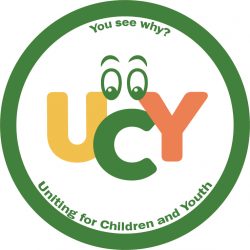
Uniting for Children and Youth is asking people to consider the question, “What is school for?” It’s a question that candidates for school board trustee will have considered and to best fulfil their duties they need to know what the public thinks of the issues it raises.
The question is relevant. Modern times require that we reconsider the purpose of public education. Ken Robinson’s video “Changing Education Paradigms” is one of the strongest voices making this point.
Signs of public education failing to do its job were highlighted in 1968 with the publication of the Ontario study on education titled “Living and Learning”. It states:
“Today, on every side, however, there is heard a growing demand for a fresh look at education in Ontario. The Committee was told of inflexible programs, outdated curricula, unrealistic regulations, regimented organization, and mistaken aims of education. We heard from alienated students, frustrated teachers, irate parents, and concerned educators. Many public organizations and private individuals have told us of their growing discontent and lack of confidence in a school system which, in their opinion, has become outmoded and is failing those it exists to serve.”
This year, fifty years later, the Ontario Institute for Studies in Education – OISE published a survey that found only fifty percent of people are satisfied or very satisfied with public education. Also this year, the World Economic Forum published an article that states, “Traditional education does not sufficiently value innovative and entrepreneurial thinking – our system even dumbs down the creative genius that we were born with, according to a test developed by NASA.”
Despite the concerted efforts of competent people striving for decades to improve public education, the level of discontent remains high. Increasingly, people are realizing that the industrial education model, based on age-segregation and subject promotion, is not suitable for achieving the equity and inclusion, and fostering the creativity and innovation essential for widespread satisfaction with our schools. The democratic learning model is emerging as a good alternative, but can it fulfil what we see as the purpose of education? By pursuing the answer to the question, “What is school for?” we position ourselves to determine if we need to seriously explore the potential of the democratic education model to meet the needs of all people in our changing times.
The following references can serve to stimulate thinking about the question.
“Living and Learning”, also known as “The Hall-Dennis Report”, has a section titled “On Aims of Education”, p. 67. The Report is available online at: Living and Learning: The Report of the Provincial Committee on Aims and Objectives of Education in the Schools of Ontario.
In his blog for Psychology Today, Peter Gray has a post titled What Are the Proper Purposes of a System of Schooling? Another post of his that expands thinking on the topic is Differences Between Self-Directed and Progressive Education.
The Sudbury Valley School is perhaps the best-known example of a completely democratic school. The homeschooling subgroup known as “unschoolers” applies the same student-led approach to learning. Daniel Greenberg, a co-founder of Sudbury Valley, says that it is the job of school to bring the real world to the attention of the students. Something to keep in mind when considering this approach is that it does not require a flip-flop. In Ottawa, John McCrae Secondary School and Lester B. Pearson High School have provided examples of how schools might become a little more democratic. They raise the prospect of an incremental transition to a more appropriate model for public education. That new model may end up being more, but not fully, democratic. A grounded theory approach to change, systematic research to systematically generate the vision of a new school model, would be the way to investigate its full potential.
UCY will be providing updates on this topic as we approach Election Day October 22nd. To stay informed, please subscribe to Uniting for Children and Youth.

